Endless Night (1972)
Directed by: Sidney Gilliat
Written by: Agatha Christie, Sidney Gilliat
Starring: Britt Ekland, Hayley Mills, Hywel Bennett, Per Oscarsson
UK
AVAILABLE ON BLU-RAY AND DVD
RUNNING TIME: 100 mins
REVIEWED BY: Dr Lenera
SPOILERS!
Michael Rogers is a chauffeur with little money, but big dreams. Foremost of these is building his dream house on Gypsy’s Acre, the perfect piece of land in Wales. Michael gets his chance when his new girlfriend, Ellie, turns out to be an extremely wealthy heiress who buys Gipsy’s Acre, even if it’s initially to his irritation. The two are wed and are soon living in a modern home on Gipsy’s Acre built by renowned architect Santonix. However, Micheal comes under the disapproving eye of both Ellie’s greedy family and her interfering best-friend Greta, while an elderly gypsy woman named Mrs. Townsend keeps reminding him of the local legend that says their property is cursed….
To reveal or not to reveal – that is the question? What am I talking about? The Twist, that’s what. Way back in the early days of HCF, I was rather too spoiler-ish at times, and was even told off by a member of a discussion forum when I pasted my review of The Cabin In The Woods which revealed too much without having a warning. These days I’m much more careful. However, it’s hard to really discuss the curious, heavily flawed but interesting Endless Night in much detail without giving away its huge surprise four fifths of the way through, which the British posters claimed that only three out of a hundred people get. However, by contrast, the American poster pretty much gave the game away by showing a close-up of one of the characters menacing another one. So for once I’m going to unashamedly give the game away too and early on to boot. The reveal is so important as to why this film doesn’t really work but also why it’s sort of unique. And it really does come across as a kind of companion piece to Twisted Nerve, my review of which I posted an hour ago, with so many similarities. Aside from also starring Hywel Bennett and Hayley Mills with music by Bernard Herrmann, it’s also directed by an elderly British filmmaker who usually made much lighter fare and who worked for Twisted Nerve‘s director Roy Boulting to boot, is also a very talky piece with a fair bit of what some may consider padding, also exists on the edge of the horror movie – and also has Bennett as a scheming, murderous psychopath, though of course in Endless Night Bennett isn’t revealed to be so until near the end. Yes, on the face of it this sounds great, but the main reason why that afore-mentioned poster quote is probably accurate is that up to then we’ve been misdirected in a rather unfair fashion. Sound odd? Well, at least I can now attempt to go into detail about this rather than be vague.
It’s based on a very late novel by Agatha Christie which was certainly not one of her typical whodunnits. The title came from William Blake’s poem Auguries of Innocence which also inspired the Doors song End Of The Night. Producer Frederick Launder and director Sidney Gilliat had spent two years working on a comedy about British divorce called Sex and the British, but then had to shelve it when a change in British law meant the plot had become obsolete. So instead they decided to adapt the Christie novel, with Gilliat to write and direct and Launder to produce, though for some reason the film ended up being produced by Gilliat’s brother Leslie. The book was followed quite closely, but one character and murder was omitted and another character and murder made ambiguous as to whether they’d existed and taken place at all. Filming took place mainly in the Isle of White substituting for Wales, with additional bits at Grim’s Dyke in Harrow, Il San Pietro di Positano, Positano in Italy, Christie’s Auction House in London, and Shepperton Studios. This was one of George Sanders’s last pictures and he sometimes forgot his lines as he was beginning to lose his memory. Meanwhile Britt Ekland won friends by introducing cast members to grapefruit juice and vodka, an alcoholic drink that you can consume a lot of without putting on weight or it being noticed you’re having booze. Herrmann wanted to use a theramin in his score, but at the time there wasn’t a theramin player in Britain so Howard Blake, who’d arranged jazz versions of his Twisted Nerve theme for use in the film, brought over a Moog synthesiser which, he ended up using in three scores. Christie’s husband Sir Max Mallowan saw a preview and said, “I think Agatha would be upset by all the violence” – even though there’s only one bit in the film. Christie didn’t like it anyway, being especially annoyed at a pretty mild sex scene. It did okay box office in the UK despite mostly terrible reviews [which isn’t quite fair – the film does have its merits and is certainly daring], and wasn’t released in US cinemas at all.
Waves crashing against rocks are a very ‘old school’ device for setting a mood, and here they’re followed by a cut to idyllic countryside and a voice-over which if you think about it provides a nice twist on Rebecca‘s “last night I dreamed I went to Manderley” as Micheal Rogers’s voice says to us, “I’ll never forget Gpysy’s Acre as I saw it for the first time”, followed by three rapid zooms with different tints into the woman soon to be named as Elle Thomsen, the final one showing her to have no face in an unnerving image. In retrospect, it does make sense, as the story that’s about to be told to us is being told by a killer haunted by what he’s done. Cut to the legs of two men walking and the same voice telling his companion that he’s not sure how to tell his story. However, he does begin to do so, beginning with a great shot of Michael reflected in the door windows of an art gallery walking towards the camera. We seen him lose a bid at an auction, though he apparently likes to attend such events as for a few seconds an item that he bids for is essentially is before he loses it. He drifts from job to job, and soon loses his current one as a chauffeur, though at least he got to know architect Santonix before hand. Funny how he knocks back the booze then it’s back in the car, straight off to his next fare. Those were the days. He really wants to own this Gypsy’s Acre plot of land, and it is for sale, but of course he has hardly any money. Enter the “sixth richest girl in the world”, American heiress Ellie, whom he actually happens to meet at Gypsy’s Acre. A romance takes place and we are just about involved, what with the immense class divide, the unwelcoming relatives of Ellie, and in particular the spooky old house [but why do we never go inside it?] and the equally spooky old lady wondering about going on about evil and past events.
However, there’s not really much of a sense of building up to something, and a few scenes seem awfully like padding like when a rather silly bit where Michael, Ellie and Greta Ellie’s friend all go outside to investigate a noise independently of each other and suddenly bump into each other really quickly. But there’s that cat statue brought to the house by Greta which seems to be some kind of bringer of evil – we even see light reflecting off its eyes in one shot. And then, just when you think that nothing major is going to happen, Ellie has a fatal horse riding accident, and a few scenes later this is revealed to have been orchestrated by Michael and Greta, who have celebratory sex while the camera amusingly cuts to musical instruments. Okay, it’s very surprising, and is followed by some astute commentary on story telling and unreliable narratives. But neither Christie nor Gilliat have played fair with us, because aside from perhaps a couple of moments near the beginning, there aren’t any bits which you look back on and say to yourself “why didn’t I cotton on” like all the best tales with twists. The extremely lengthy lead-up contains a profusion of loose ends and pointless characters, most of which could have been omitted entirely without changing the story to any great degree. There’s a broken window that’s never explained. A car that takes an unusually long to get somewhere yet we are never told why. Santonix seeming to know things the audience does not yet no explanation being offered of how he knows them. And that bloody cat which hints at the supernatural then is totally forgotten about. We’re possibly supposed to infer that Michael could have made virtually everything up, something that is indeed hinted at in the final scene, but I think that there’s a difference between surprising the viewer and subsequently leaving some details up to his or her interpretation, and throwing up a load of stuff which is then mostly proved to be irrelevant.
Gilliat said that the film is a better watch the second time around, something which suggests that there are clues to be found, but seeing as I viewed it very intently I just can’t see how that can be the case, except perhaps with regard to Bennett’s performance, which just may have been showing that his character is hiding something in a few scenes. He does succeed in getting through to the viewer that Michael grows to love the person he murders. And there’s one very haunting moment when Michael sees a genuine ghost, Mills able to look actually quite eerie here. Gilliat does at times attempt a more overtly stylistic approach than one might expect of someone whose career dates back in the ‘30s, with some disconcerting cuts from one scene to another, just plain weird bits like one character ‘becoming’ a scarecrow and falling to the ground, and some use of paintings to suggest a certain state of mind, though he never quite succeeds in getting through to the viewer Michael’s screwed up brain. Scenes in an art gallery and riding horses could be deliberately evoking similar scenes in Alfred Hitchcock’s Vertigo and Marnie respectively, and in fact the Master of Suspense was clearly being thought of throughout, perhaps no surprise seeing as Gilliat scripted Hitchcock’s superb The Lady Vanishes in 1938 the best of his British pictures. But so much frustrates. There’s some emphasis on the way that the house’s large glass windows can be made into one-way mirrors with the push of a button, and this seems designed to motivate a major plot point to come, but the one-way mirror business amounts to nothing, and Gilliat fails to make much of this setting which can possibly be seen as representing the inside of its main character’s head – or am I just interpreting symbolism that actually isn’t there?
Mills is really playing far more of an ‘object’ than a fully fledged character, though at least she looks healthier than in Twisted Nerve, and 007 fans will enjoy seeing not just Britt Ekland and the definitive Miss Moneypenny Lois Maxwell but also Walter Gotell in the same film, though Maxwell has little to do except look annoyed and Gotell only appears very early on. Sadly George Sanders by now has lost some of that wonderful voice, and he doesn’t look too well either. Herrmann’s score is certainly far better than Twisted Nerve’s, even if it doesn’t have a catchy main theme like that movie. While his main title piece, a piece which Ellie is supposed to sing a vocal version of later on even though it’s clearly not Mills at all doing the voicing, is a very ominous, highly simplified variation of his Marnie theme, throughout the score he mostly alternates aching and passionate romance with discordant interruptions, obviously totally in tune with what the film was trying to do. A short passage from his concert work Souvenirs de Voyages turns up in one scene. I do almost admire the way that this film totally disregards narrative economy, and it’s possible that this may turn into actual admiration in time. But for this kind of thing to succeed, it’s best that the film in question needed to be more overtly stylised throughout and, despite Gilliat trying here and there to do something different, he’s still generally stuck in a ‘classical’ approach for much of the time. While I most definitely like much of Gilliat’s work, I can’t help but think of what would have happened if this project had come to fruition in Italy which was going through the most productive period of the giallo at the same time as Endless Night was in production. The result could possibly have been quite something – though this time Christie would probably have really complained about the violence!
Rating: 










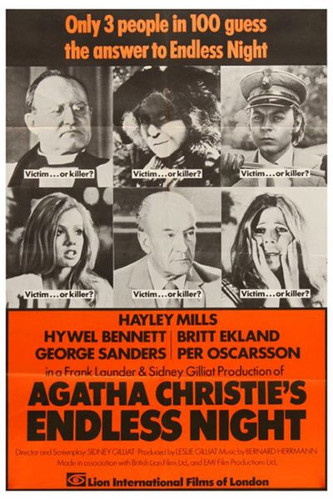
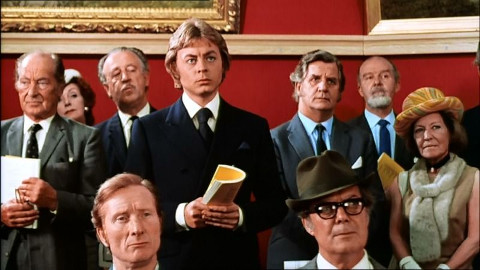
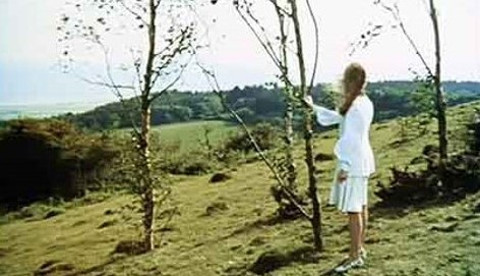

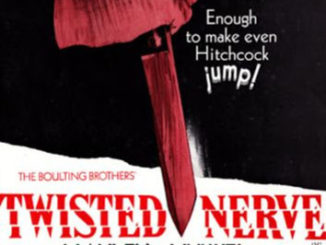
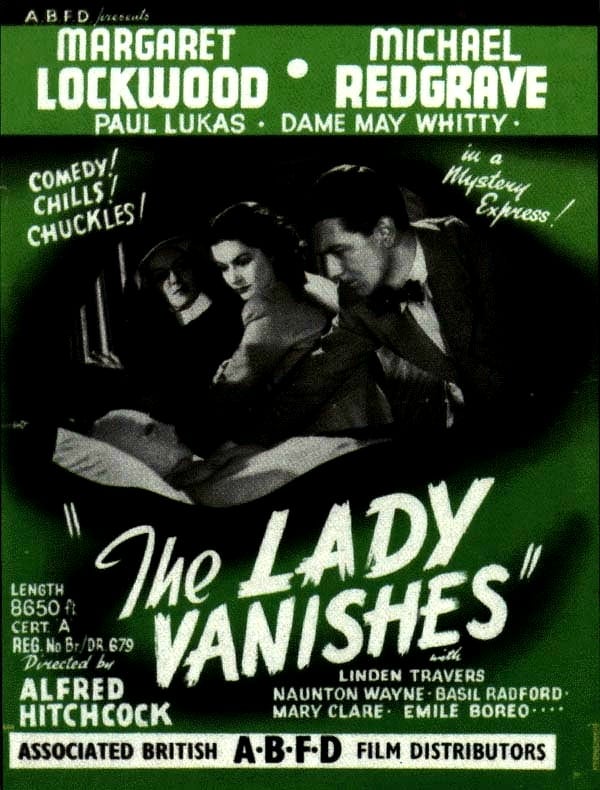
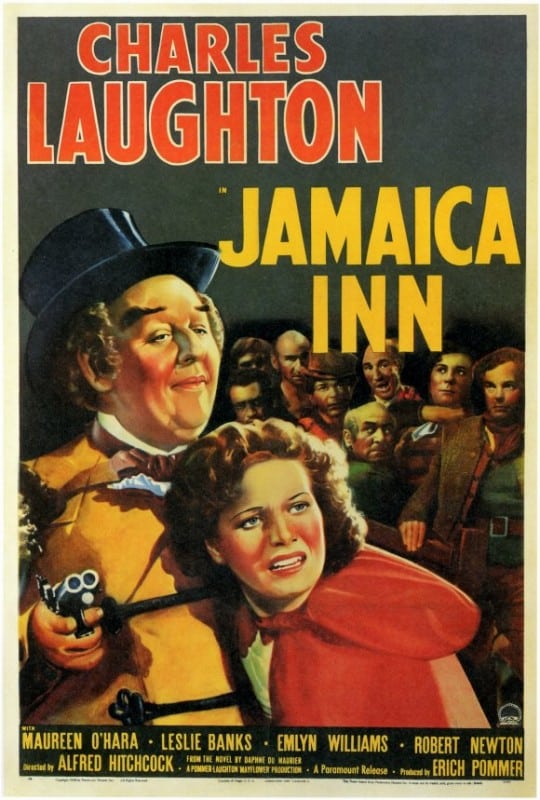
Be the first to comment